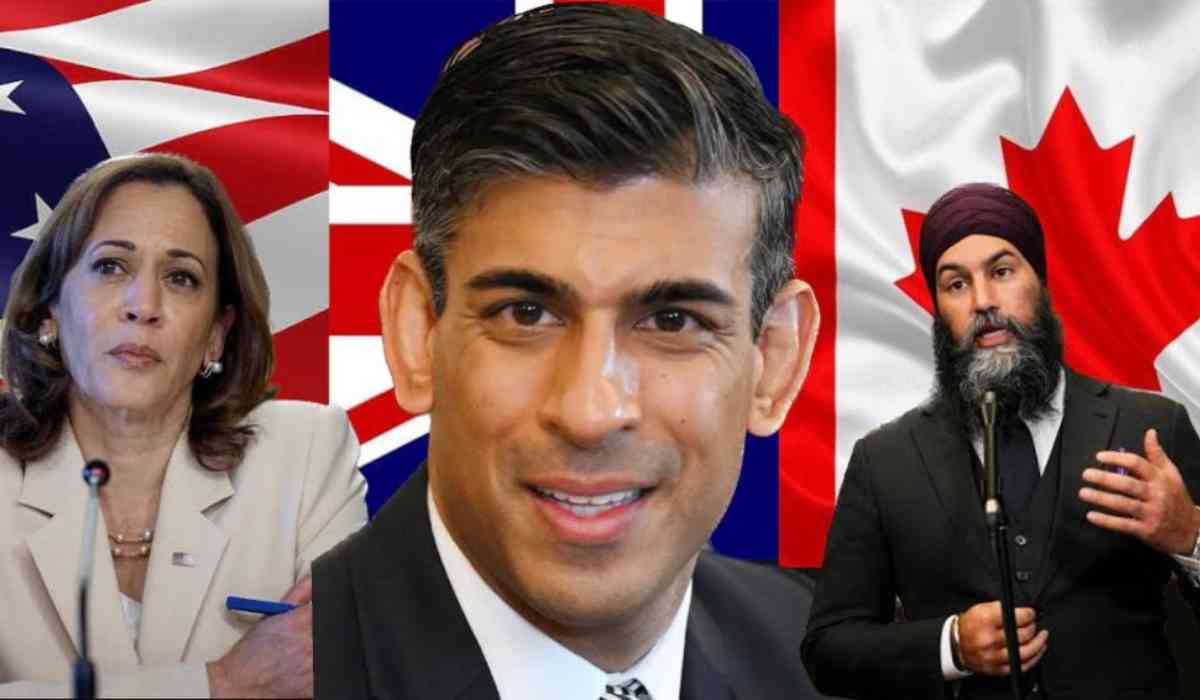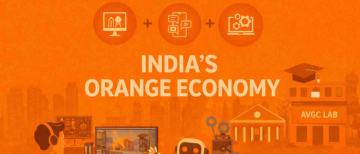In the realm of global politics, individuals with roots in Indian cultures are emerging as influential figures, ranging from charismatic leaders to skilled diplomats. The 2021 Indiaspora Government Leaders List, published by a US-based organisation dedicated to the Indian diaspora, highlights over 200 individuals of Indian descent in leadership roles across 15 countries, with more than 60 holding Cabinet positions.
From Rishi Sunak taking over as UK’s first Prime Minister of Color to Kamala Harris being the first Female Vice President of the world’s oldest democracy, US, there exists a long list of Influential Indian origin leaders apart from Rishi and Kamala.
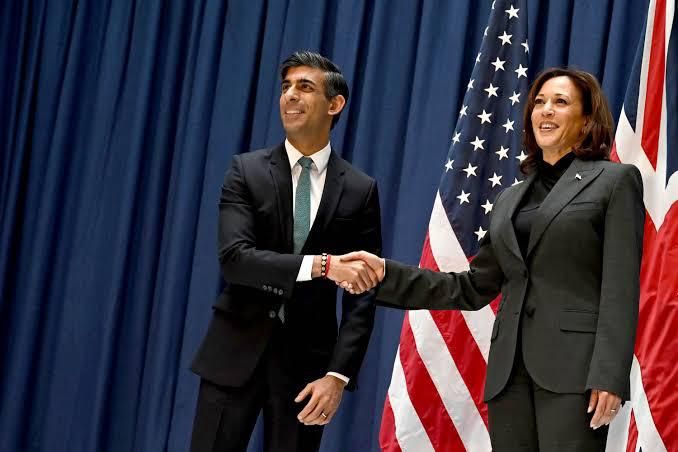
Heads of States and Heads of Government
- Leo Eric Varadkar, Ireland's Prime Minister, is of Indian origin, with a father born in Mumbai.
- Antonio Costa has been Portugal's Prime Minister since 2015, with a heritage that is half Indian and half Portuguese.
- Tharman Shanmugaratnam's decisive win in Singapore's presidential election adds to the list of Indian-origin leaders in global politics.
- Wavel Ramkalawan, is of Seychellois origin and has Indian ancestry. He is a prominent political figure who became the President of Seychelles in October 2020.
- Christine Carla Kangaloo, the president-elect of Trinidad and Tobago, hails from an Indo-Trinidadian family.
- Mohamed Irfaan Ali, born on August 2, 2020, hails from a Muslim Indo-Guyanese family in Leonora, West Coast Demerara, and has served as Guyana's ninth executive President since 2020.
- Chandrikapersad 'Chan' Santokhi, a former police officer, became the ninth President of Suriname in 2020 through an uncontested election.
- Pravind Kumar Jugnauth, a Mauritian politician born into a Hindu family with roots in Uttar Pradesh, has been the Prime Minister since 2017.
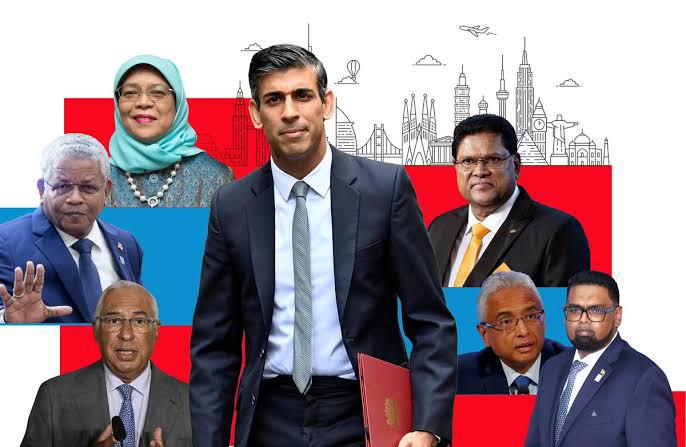
Moreover, Priyanca Radhakrishnan becomes the first person of Indian origin to be a Minister in New Zealand, born in Chennai to Malayali parents. Pritam Singh, Leader of the Opposition in Singapore since 2020, is an Indian-origin lawyer and author. Dave Sharma, Australia's first Indian-origin lawmaker, transitioned to the Senate after winning the New South Wales Liberal Senate race in November 2023.
With a diaspora exceeding 32 million people, as reported by India's Ministry of External Affairs, those of Indian origin constitute the world's largest diaspora population. The Western Trio United Kingdom, United States of America and Canada stands as the largest Indian Diaspora population globally, with each nation witnessing consistent influx of Indian immigrants every year.
In this Report, I'll take this Trio as case studies and will further elaborate about the ‘Prominent Presence’ of Indian Origin leaders in the Politics of this Nation. This Political Presence highlights the Significance of Representation of the ‘Minority Communities of Indian, Indian Origins or Individuals having Indian ancestry.’
Indians celebrate Indian origin leaders assuming important positions at global level with great pride, so we’ll analyse how this has Impacted this Trio’s relationship with India, with Indian origin- Kamala Harris as Vice President of US, Rishi Sunak as PM of UK and Jagmeet Singh, An Important Ally of Justin Trudeau’s Government in Canada.
UNITED STATES
In 2020, the Asian Indian alone population emerged as the largest Asian alone population group in the United States, experiencing a remarkable growth of over 50%, surging from 2,902,204 in 2010 to 4,397,737 in 2020, as indicated by information from the U.S. CensusBureau.
Despite constituting around 1% of the U.S. population, Indian Americans now hold approximately 1% of the seats in the U.S. Congress, marking a historic milestone. The presence of five Indian Americans in Congress underscores the community's remarkable political ascent to the highest levels of public service.
Indian origin in US Politics
In 2013, the House of Representatives had only one Indian American member, with fewer than 10 serving in state legislatures and none in the Senate or running for president. In 2023, A decade later, the Congress had five Indian Americans, nearly 50 in state legislatures, and the vice president was of Indian descent.
In 2021, Kamala Harris became the Vice President of the United States, making history as the first woman, person of colour, and individual of Indian heritage in this role. At 56, she broke barriers, not only as one of the few Asian Americans in the Senate but also as the first Indian American elected to the Senate in 2016.
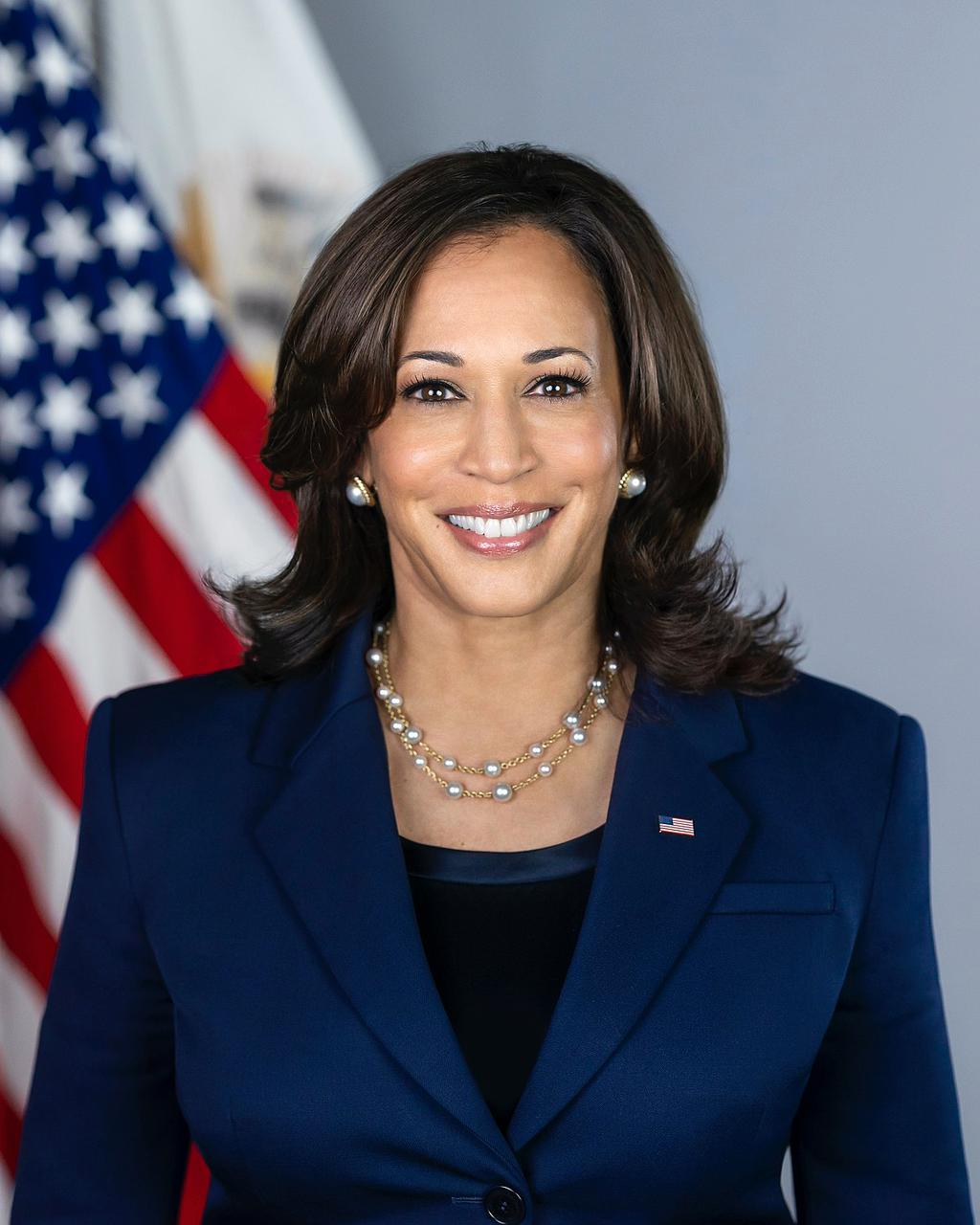
In 2016, a significant moment occurred when then-Governor Bobby Jindal made history as the first Indian American to run for president. Looking ahead to 2024, two Indian Americans are in the running for the Republican nomination. Nikki Haley, a seasoned politician with a background in senior government roles, is joined by Vivek Ramaswamy, a wealthy entrepreneur known for his stance against "wokism." Nikki Haley's recent announcement adds to the trend, making 2024 the third consecutive presidential election cycle featuring an Indian American candidate.
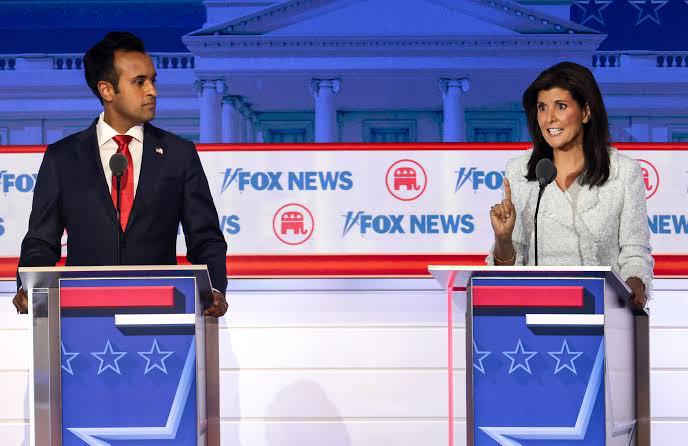
Dalip Singh Saund, the first Indian American elected to Congress in 1956, broke barriers for Asian American representation. In 2004, Bobby Jindal marked a significant milestone by being elected to Congress from Louisiana, later becoming the state's governor. Ami Bera's election in 2012 made him the third Indian American in Congress.
When Ami Bera, a California Congressman, first took office in 2013, he was the sole Indian American in the U.S. House of Representatives, and this number has quintupled, including the election of Shri Thanedar last year. Besides Bera, Thanedar, and Krishnamoorthi, the "Samosa Caucus," as they humorously refer to themselves, also comprises Ro Khanna and Pramila Jayapal.
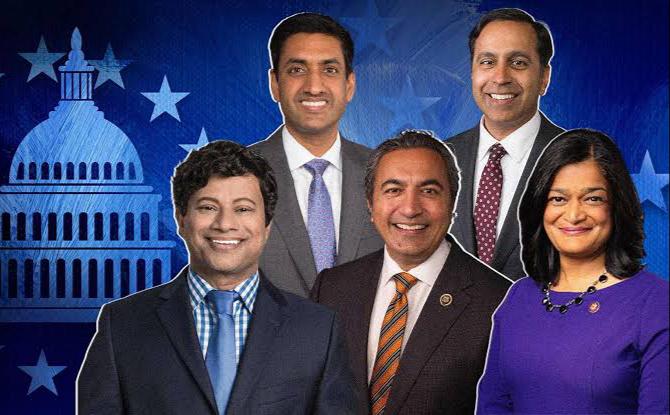
In the 2020 elections, Jenifer Rajkumar, a 38-year-old Indian-American lawmaker, made history as the first South Asian woman elected to the New York State Assembly.
Rapid Rise of Representation?
The increasing size and impact of the Indian American community nationwide are frequently attributed factors. According to Khanna, who represents Silicon Valley, "There has never been a better moment to be an Indian American—we are leading on contributions to American job creation, American innovation, American education, American hospitality, and American health."
The community's advancement in the public sphere is often seen as a natural progression following successes in various other fields. According to Krishnamoorthi, "The growing Indian American presence in Washington follows the emergence of Indian American leaders in so many other fields, including medicine, science, technology, and business."
The changing cultural and demographic landscape of the U.S. has fostered a heightened understanding that a representative government is more adept at tackling the distinctive challenges of diverse communities. As Thanedar notes, "It’s a sign of the American voter acknowledging the strength and importance of our community and our ability to deliver for everyone."
Impact on India-US relations
Indian Americans perceive the U.S-India relations as a relatively low-priority issue in the current electoral cycle. Their focus lies more on nationally significant matters like healthcare and the economy.
Kamala Harris, alongside Indian PM Narendra Modi, emphasised the strong India-US connection during a State Department lunch, during PM Modi’s 2023 visit to US. Modi commended Harris for elevating this bond and praised her achievements, calling them a source of pride globally. At the luncheon's close, Harris shared how India's history influenced her, expressing a deep connection to the country. She acknowledged India's global impact and its role in inspiring millions through philosophy, civil disobedience, and a commitment to democracy.
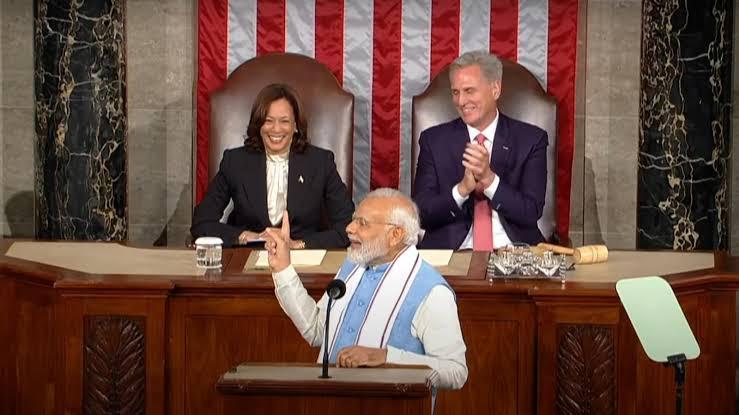
The increasing presence of Indian Americans in Congress, including figures like Khanna, Krishnamoorthi, and Bera, has played a crucial role in reinforcing U.S.-India relations. These members have a significant track record of advocating for the strategic partnership between the two nations, offering a distinctive viewpoint on the complex relationship.
Recently, Khanna, serving as co-chair of the House Caucus on India and Indian Americans, successfully led a Congressional delegation to India, further contributing to diplomatic ties. As the grandson of a renowned freedom fighter, Khanna, whose ancestor was imprisoned with Mahatma Gandhi by the British, undertook a significant visit. Engaging with figures like Prime Minister Modi and Bollywood megastar Amitabh Bachchan, Khanna's successful trip showcased the depth of India's political and cultural landscapes. It underscored the vital contribution of diaspora members of Congress in fortifying one of the world's most crucial bilateral relationships.
UNITED KINGDOM
The Indian diaspora in the UK holds a significant presence, being the largest immigrant group. Their demographic is characterised by youth, rapid growth, and relatively high education levels, contributing to their status as one of the country's top-earning ethnic groups. The expanding numbers have also amplified their political influence and standing in the community.youngest British prime minister in almost two centuries, marking a significant milestone in the country's political landscape. His family's migration from East
Indian origin in Britain’s Politics
Rishi Sunak's background as a practising Hindu with Indian heritage adds a unique dimension to his position as the leader of the UK. At 42, Sunak is notably the Africa in the 1960s and the historical context of British colonialism highlight the diverse tapestry of the nation.
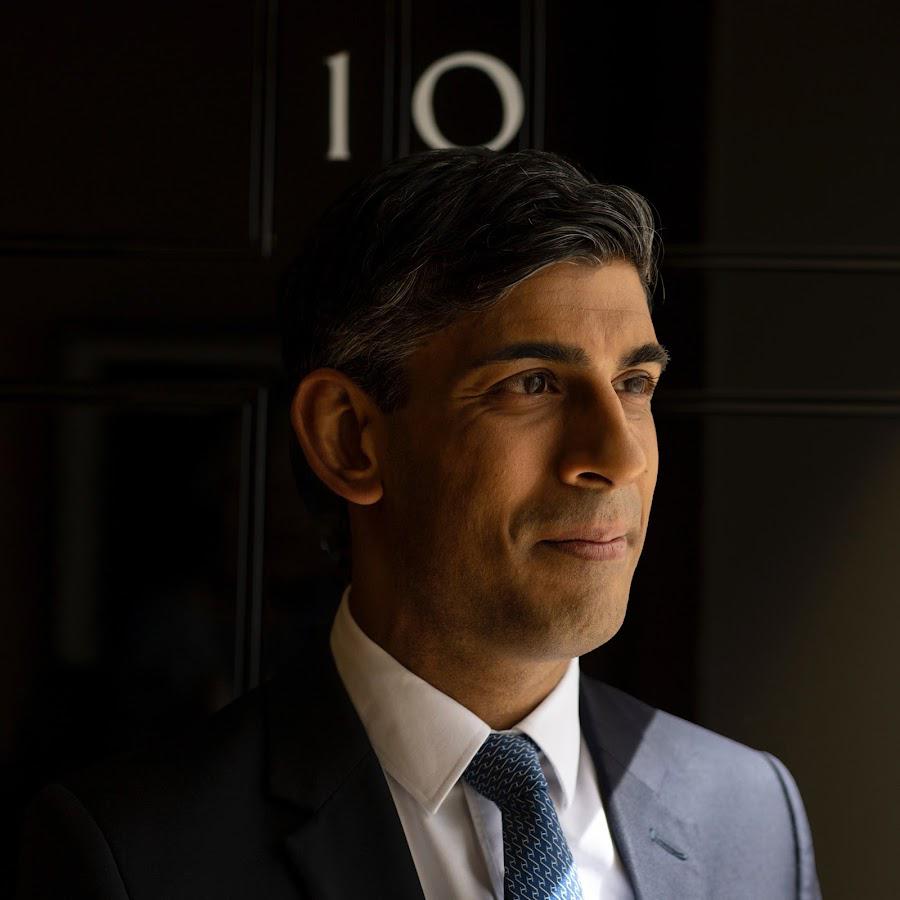
Rishi Sunak's current Cabinet includes only 1 Indian Origin MP Claire Coutinho, who serves as the Secretary of State for Energy Security and Net Zero succeeding Suella Braverman who was sacked by Rishi Sunak during Cabinet Reshuffle.

The presence of Indian-origin ministers in key positions reflects the diversity and contributions within the government, with Braverman having a longstanding tenure under various prime ministers, including Theresa May, Boris Johnson, and Liz Truss. Under Boris Johnson's leadership, Priti Patel served as the Home Secretary, overseeing domestic affairs, while Alok Sharma held the position of International Development Secretary, responsible for international aid and cooperation.
Impact on India-UK relations
Similar to the US, The UK diaspora's support for Indian Prime Minister Narendra Modi varies, with Conservative Party supporters and Hindus showing more positive sentiments about his job performance. Interestingly, UK-India relations aren't widely considered a top political issue among British Indians.
Following the initial meeting between Prime Ministers Sunak and Modi at the G20 Summit in Indonesia, Chancellor Sunak launched the UK-India Young Professionals Scheme.
After PM SUNAK was appointed. UK reinstated itself on the list of countries that offered speedy e-visa services, another positive outcome of Sunak-Modi bilateral meet.
Rishi Sunak, drawing on his Indian roots, aims to foster economic collaboration between the two nations. Sunak's leadership has seen significant strides in strengthening economic ties, marked by initiatives such as the UK-India Roadmap 2030 and the Enhanced Trade Partnership. These agreements aim to boost investment, trade, and employment opportunities between the two nations.
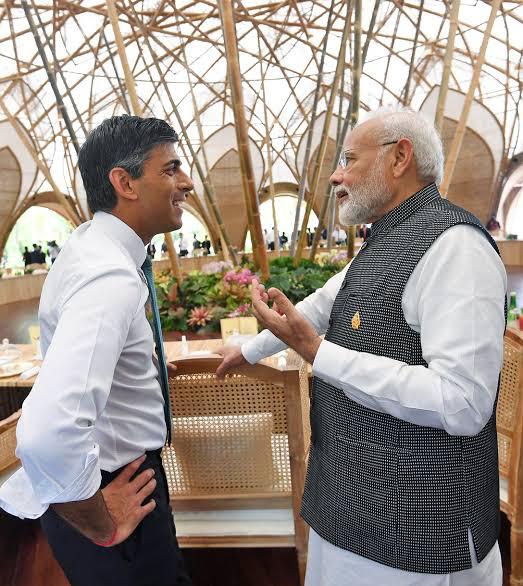
The UK Prime Minister emphasised the significance of India and the UK as "two great democracies" that play a pivotal role in shaping the global future. During a bilateral meeting with Prime Minister Narendra Modi in India, Sunak highlighted the close and expanding ties between the UK and India, emphasising the "living bridge" connecting their people
The U.K. The Prime Minister's Office stated that Rishi Sunak reiterated the UK's ambition to achieve a significant trade deal (FTA) aiming to benefit businesses and workers in both India and the UK. The goal is to foster growth in trade for both goods and services, reflecting the commitment to establishing a landmark free trade agreement between the two countries.
Rishi Sunak, the British Indian leader, praised the UK's "most competitive visa regime," asserting it as the world's best for investment and business. Amid concerns within the Conservative Party over high migration, Sunak emphasized the importance of recognizing talent, stating that nearly half of the most innovative UK companies have immigrant founders. Addressing CEOs of major businesses, he highlighted the UK's appeal for innovators, entrepreneurs, and researchers due to its competitive visa regime for highly skilled international talent.
CANADA
Constituting approximately four percent of the Canadian population, Indians have become a highly influential demographic group in the country's politics. According to Statistics Canada, the Indian-origin community is one of the fastest-growing demographic cohorts, establishing itself as the second-largest non-Caucasian group in the country, following Chinese Canadians.
In 2016, Punjabi was officially recognized as the third language of Canada, following English and French. This decision followed four years of Punjabi being a prominent language in the Canadian Parliament and the election of 20 Punjabi-speaking candidates to the House of Commons.
Indian Origin in Canada's Politics
Three Indian-origin ministers are integral members of Canadian Prime Minister Justin Trudeau's recently re-elected government.
- Anita Anand: Serving as the President of the Treasury Board, she made history as the first Hindu federal minister in Canada. Anita Anand, whose parents were from Tamil Nadu and Punjab, assumed her role on July 26, 2023.
- Harjit S. Sajjan: He holds the positions of President of the King’s Privy Council for Canada, Minister of Emergency Preparedness, and Minister responsible for the Pacific Economic Development Agency of Canada.
- Kamal Khera: Heading the Ministry of Diversity, Inclusion, and Persons with Disabilities, Kamal Khera is another Indian-origin member of Trudeau's Cabinet.
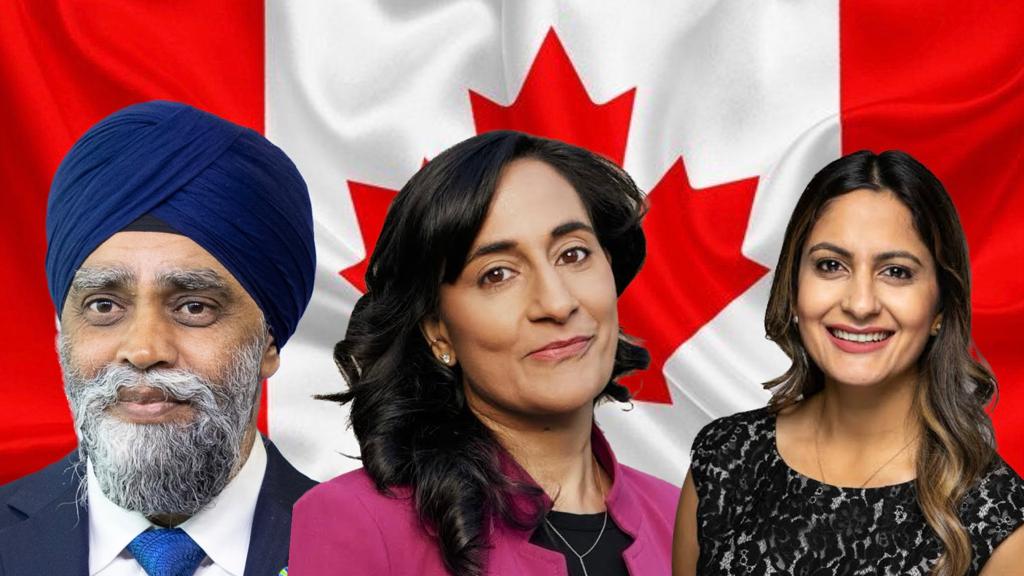
The outside support crucial for Trudeau's government comes from Jagmeet Singh, leader of the New Democratic Party (NDP), who is also of Indian origin. In September 2021, Trudeau's Liberal Party secured reelection but fell short of a parliamentary majority. In March 2022, Trudeau and NDP leader Jagmeet Singh struck a deal for support, focusing on common ground in areas like pharmaceutical and dental care plans.
The conservatives criticised it as a 'power grab.' Singh's influence on Trudeau is significant, with Trudeau's government reliant on the NDP for political survival since it lacks a majority. Elected as NDP leader in October 2017, Singh, the first visible minority and Sikh to lead a major national party in Canada, has been instrumental in shaping the political landscape through key positions and policy stances.
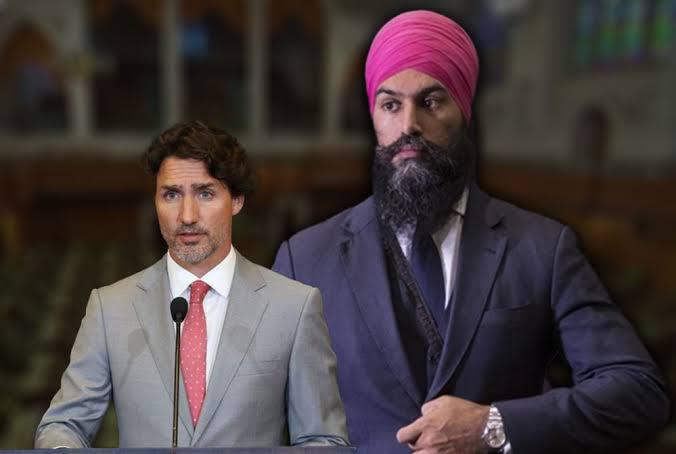
In the September 20, 2021 elections, a record-breaking 49 Indo-Canadian candidates participated, with 16 from the Conservative Party, 15 from the Liberal Party, 12 from Jagmeet Singh's New Democratic Party (NDP), and six from the far-right People’s Party of Canada.
Rapid Rise of Representation?
Indo-Canadians, particularly Punjabis and Sikhs, form a significant and influential political force in Canada, notably during Trudeau's tenure as Prime Minister. Trudeau, in both his first and second terms, appointed four Indo-Canadians to his cabinet, showcasing the community's political impact.
The Sikh connection has been beneficial for Trudeau, with Punjabi Canadians, mainly Sikhs, playing a crucial role in his leadership of the federal Liberal party and his subsequent position as Prime Minister. Trudeau's Liberal Party, known for its support for immigrants, has implemented favorable rules and laws, and Trudeau himself has actively engaged with the Sikh community through visits to gurdwaras, participation in Diwali celebrations, and showcasing his bhangra moves.
Trudeau's humour was evident when he joked during a 2016 visit to the US, stating, "I have more Sikhs in my cabinet than Narendra Modi (Indian Prime Minister)."
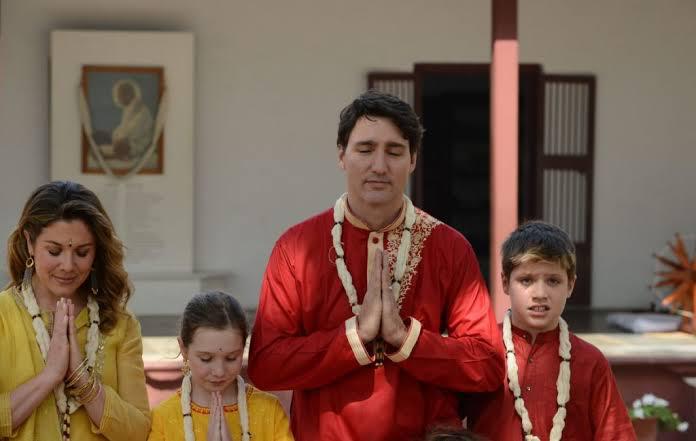
The Punjabi, particularly Sikh, community has solidified as a potent political force due to its extensive history of active political engagement, unity, and strong organizational strength. Active participation in gurdwara elections and a strong work ethic contribute to the community's political influence.
The community played a pivotal role in fundraising and advocating for the safe immigration of Punjabi immigrants into Canada, providing support with housing, jobs, and addressing societal racism. Social and political activism not only increased their visibility but also ensured that Sikhs became actively involved in politics from a young age
“The Indian diaspora in Canada is much sought after as a support base as they tend to be high income professionals and educated. As a group, the people of Indian origin, especially the Sikh diaspora in Canada have become a powerful group and prominent voice in domestic political space,” notes Indian Council of World Affairs (ICWA), and adds that the number is only rising.
Impact on India-Canada’s relations
Jagmeet Singh, the leader of Canada's leftist New Democratic Party (NDP) and a crucial ally of Prime Minister Justin Trudeau, holds significant influence over Trudeau's government, which has strained Canada's relations with India due to Singh's pro-Khalistan stance.
Jagmeet Singh, a Canadian MP and Sikh of Indian origin, garnered attention for speaking at a pro-Khalistan rally in San Francisco in 2015. In 2013, Jagmeet Singh faced a visa denial to India, reportedly due to alleged anti-India activities and connections with extremists. Singh asserted that he intended to visit Amritsar to be honoured as 'Sikh of the Year' by two NGOs.
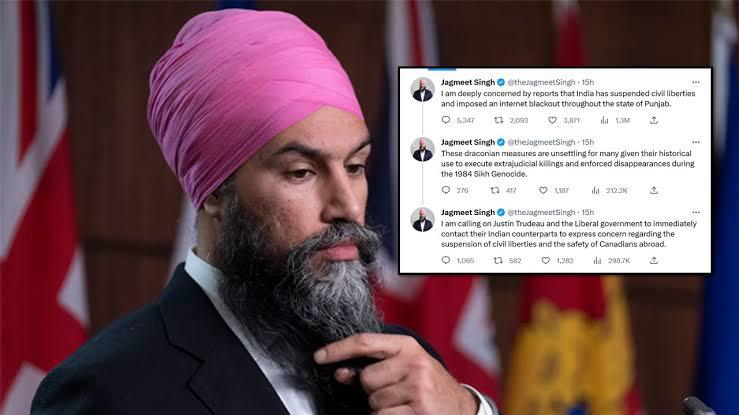
Jagmeet Singh, at a 2015 rally in San Francisco, was seen in videos with a large poster of Jarnail Singh Bhindranwale, a Sikh militant leader. The event also showed Singh participating in a pro-sovereignty march with signs calling for an independent Sikh homeland- Khalistan.
In the ongoing dispute between India and Canada over the killing of Hardeep Singh Nijjar, that has impacted India-Canada ties in the worst way possible, Singh has vowed to seek 'justice' for Nijjar, who is labeled as a terrorist. His stance is believed to impact Prime Minister Justin Trudeau's pro-Khalistan politics. Singh’s recent call for India's inclusion in a probe on foreign interference in Canadian affairs has further strained relations, reinforcing suspicions of Indian interference, according to Singh.
What is the Significance of the Rise of Indian Origin in world Politics
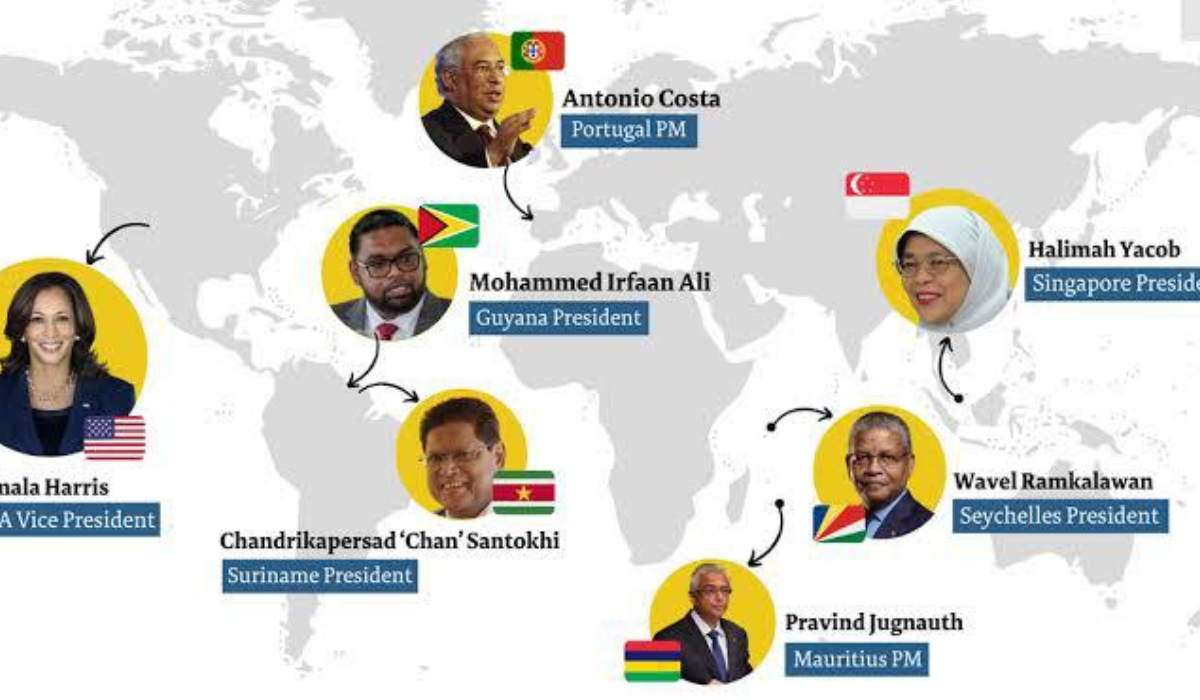
- These leaders are crafting a legacy for future generations, one that reaches beyond our community to encompass all the constituents and communities they serve," stated MR Rangaswami, founder of Indiaspora and a Silicon Valley-based entrepreneur and investor. The more common Indian faces become in Congress and in public service generally, the more inspired others have become to run, contributing to the strengthening of the country and its democratic institutions.
- The increase of Indian-origin leaders in world politics not only enriches global discussions with diverse perspectives stemming from a culturally rich background but also amplifies global representation by reflecting the growing influence of the Indian diaspora in international decision-making processes.
- Leaders of Indian origin, through their pivotal role in fostering cultural exchange and promoting mutual understanding, contribute significantly to building bridges between nations. Their leadership not only facilitates diplomatic efforts by emphasizing shared cultural values but also symbolizes progress towards a more inclusive global political landscape. By breaking barriers and challenging stereotypes, they encourage greater diversity in leadership on the world stage.
- Their inclusion in government underscores the importance of representation. "Having a seat at the table is crucial for the community”. As Indians become more politically engaged, they assert their influence at the highest level of the government system, shaping perspectives in legislative processes.
- The success of Indian-origin leaders in elections holds potential benefits not just for the community but also for those planning to migrate under liberal immigration policies. The new government's commitment to facilitating the move, especially for skilled professionals and students pursuing higher studies, is expected to create a more welcoming environment. A significant representation of Indian-origin leaders in the government suggests a positive outlook toward diverse immigration, potentially enhancing opportunities for newcomers.
©️ Copyright 2024. All Rights Reserved Powered by Vygr Media.

